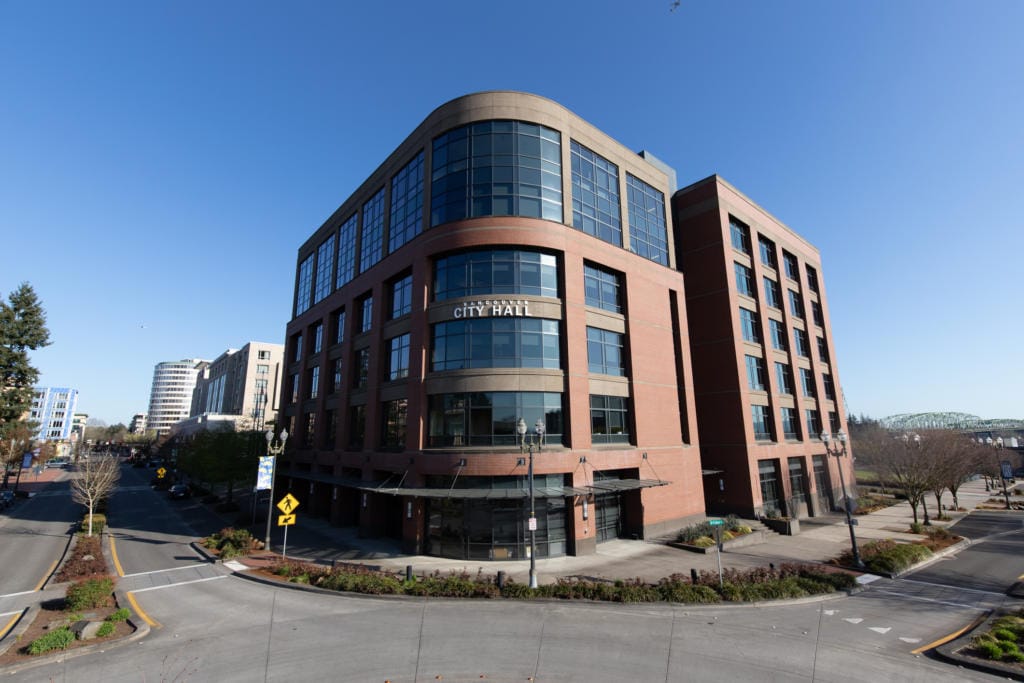Though there’s still plenty of work to be done on the 2021-22 Vancouver budget, the city’s elected leaders and staff can breathe a small, if preliminary, sigh of relief: the impact of COVID-19 doesn’t appear to be nearly as dire as the $60 million deficit initially feared.
That could still change before the year is up, emphasized Natasha Ramras, Vancouver’s chief financial officer. But in her latest update to the Vancouver city council Monday evening, she said that sales tax revenue in August was almost at a “pre-pandemic level” of $4.28 million.
“Overall the revenues keep coming in stronger than we had anticipated earlier in the year — but with the caveat that even in August, we are still seeing the impact of the federal stimulus and the additional weekly unemployment subsidy that was available and in place until the end of July,” Ramras said.
Ramras was referring to the enhanced unemployment benefit available through the Washington Employment Security Department, which up until last month granted eligible people an additional weekly $600 on top of their usual benefit. She also pointed to the $1,200 blanket stimulus check given to U.S. citizens in April.
Consumers could still tighten their belts, Ramras said, depending on whether the federal government delivers a second round of stimulus funding or reinstates the enhanced unemployment benefit.
Other than sales taxes, Vancouver’s main sources of revenue appear to have been only temporarily wounded by the pandemic. Motor vehicle gas tax receipts dipped — from $298,351 in January to $173,554 in May — but almost completely rebounded by August. Utility taxes held mostly steady though the last six months. Property tax collections saw their highest month of the year in April.
The biggest nosedive came, unsurprisingly, from a dearth of new business licence fees, where revenue plummeted from $260,233 in January to just $732 in August. Recreation program fees also dropped off a cliff, as most recreation programs were cancelled.
Vancouver received a total of $8.4 million in federal CARES Act funding, helping to alleviate the cost of responding to the pandemic.
Dire predictions unfulfilled
Five months ago, when sales tax receipts dropped off by more than $1 million between February and March, Vancouver started to prepare for a budget deficit that would amount to 40 percent of its general fund.
City leaders adopted austere measures to try and slow the financial bleeding. They immediately froze all new hires, and halted fund transfers and any discretionary spending. Around 300 nonunion city staffers took mandatory furloughs, cutting their pay by 6 percent. Another 254 part-time employees were functionally laid off — most had provided recreational or seasonal services that the city had temporarily halted due to COVID-19.
“The fiscal implications of the pandemic on the city cannot be overstated; every part of the organization will be impacted,” City Manager Eric Holmes wrote in a bleak April email to his employees.
Vancouver leaders had also planned to pull $15 million from its cash reserves, which would have all but drained the emergency fund built up after the 2008 Great Recession.
Based on data collected through August, the city is now on track to draw down its reserves by just $4 million or $5 million next year.
“The city approached the pandemic in a very conservative way. We froze certain expenditures that could have been frozen, suspended a number of initiatives — delayed some, just to give us some breathing room in time of an unprecedented uncertainty,” Ramras said.
Monday evening’s workshop kicked off the start of the planning process for the 2021-22 city budget. City councilors will discuss the topic at future meetings, with the final deadline to pass a budget set for Dec. 7. Historically, the city council has aimed to finalize its budget document before Thanksgiving.




